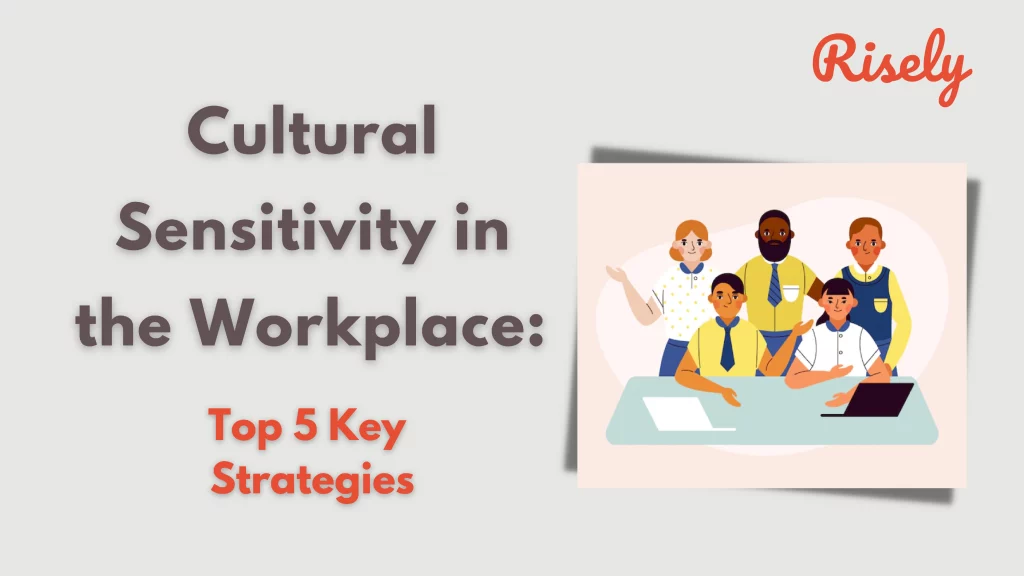Cultural sensitivity is critical for success in this increasingly diverse and globalized workplace. Understanding and respecting different cultures fosters a harmonious work environment and drives innovation and business growth. But what does cultural sensitivity mean? How does it apply specifically to the workplace? And what strategies can you implement to promote cultural sensitivity among your team?
In this blog, we will explore the concept of cultural sensitivity in the workplace in depth, examining its importance in business and how it impacts global markets. We will delve into key strategies for fostering cultural sensitivity in the workplace, and also discuss that essential areas that should be covered during a sensitivity training. By the end of this article, you’ll be equipped with the knowledge and tools to create a culturally sensitive work environment that celebrates diversity and empowers your team to thrive.
What does cultural sensitivity mean?
Cultural sensitivity refers to the awareness and understanding of cultural differences and the ability to respond respectfully and effectively when working with individuals from diverse backgrounds. It involves recognizing and appreciating various customs, beliefs, values, and practices that shape a person’s identity. Cultural sensitivity requires empathy, open-mindedness, and a willingness to learn from others to create an inclusive and respectful work environment.What is cultural sensitivity in the workplace?
Cultural sensitivity in the workplace means being aware of and respecting the cultural differences among employees and creating an environment that values diversity and promotes inclusivity. It involves understanding how cultural backgrounds shape communication styles, decision-making processes, and work dynamics. By promoting cultural sensitivity in the workplace, organizations can foster collaboration, innovation, and productivity among their employees. It fosters inclusivity, effective communication, and understanding among employees. By promoting cultural sensitivity, leaders can prevent stereotypes, biases, and discrimination based on cultural differences.Why do we need cultural sensitivity in business?
Cultural sensitivity in business is vital for several reasons. Here are some key points highlighting its importance:- Building Relationships: Cultural sensitivity fosters positive relationships with clients, partners, and employees from diverse cultural backgrounds. Businesses can establish trust, rapport, and mutual respect by understanding and respecting cultural norms, values, and practices, leading to stronger connections and long-term partnerships.
- Effective Communication: Cultural sensitivity enables effective communication across cultures. It helps interpret and understand verbal and non-verbal cues, adapt communication styles, and avoid misunderstandings or misinterpretations. Effective cross-cultural communication promotes clarity, reduces conflicts, and enhances collaboration and productivity.
- Global Market Penetration: In an increasingly globalized world, cultural sensitivity in the workplace allows businesses to penetrate new markets successfully. By understanding the target market’s cultural nuances, preferences, and needs, businesses can tailor their products, services, marketing strategies, and customer experiences to resonate with local customers, gaining a competitive edge.
- Reputation and Brand Image: Demonstrating cultural sensitivity enhances a business’s reputation and brand image. A company that values diversity, respects cultural differences, and promotes inclusivity is viewed positively by customers, employees, and the public. Conversely, cultural insensitivity or offensive behavior can lead to reputational damage, negative publicity, and loss of business opportunities.
- Talent Acquisition and Retention: Cultural sensitivity plays a crucial role in attracting and retaining diverse talent. A workplace that fosters cultural sensitivity and inclusivity appeals to a wide range of candidates and improves employee satisfaction, engagement, and productivity. It also helps create a collaborative and harmonious work environment where everyone feels valued and respected.
- Legal and Ethical Considerations: Cultural sensitivity aligns with legal and ethical considerations in international business. Many countries have laws and regulations regarding discrimination, cultural respect, and fair treatment of employees and customers. By practicing cultural sensitivity, businesses ensure compliance with these laws and avoid legal consequences and ethical dilemmas.
Other Interesting Reads
Cultural sensitivity communication in BPO environments
In Business Process Outsourcing (BPO) environments, where teams often work across borders and serve clients from different cultural backgrounds, cultural communication sensitivity is paramount. Effective communication in such settings requires understanding cultural nuances, norms, and communication styles to ensure smooth and productive interactions. Firstly, cultural sensitivity helps interpret and adapt communication styles to match the preferences of clients and colleagues from diverse cultures. It involves being mindful of language usage, tone, and non-verbal cues. Cultural sensitivity in BPO environments helps to avoid misunderstandings or unintended offenses. Certain words, phrases, or gestures may carry different meanings or cultural connotations across various regions. By being aware of these differences, BPO professionals can choose their words carefully, avoid cultural stereotypes, and adapt their communication to avoid potential conflicts or misinterpretations. Cultural sensitivity communication within BPO environments enhances collaboration, strengthens client relationships, and minimizes misunderstandings. It enables BPO professionals to navigate cultural differences effectively, adapt their communication styles, and build rapport with clients and colleagues from diverse cultural backgrounds. By valuing and incorporating cultural sensitivity, BPO organizations can deliver exceptional service while fostering an inclusive and respectful work environment.5 Key Strategies for cultural sensitivity in the Workplace
Promoting cultural sensitivity in the workplace is crucial for BPOs (Business Process Outsourcing) to create an inclusive and respectful environment. Here are five strategies for fostering cultural sensitivity in the workplace:- Cultural Awareness Training: Provide comprehensive cultural awareness training to employees, focusing on the diverse cultures they interact with. This training should cover cultural norms, customs, communication styles, and etiquette. By increasing employees’ understanding of different cultures, they can better navigate cultural differences and avoid misunderstandings.
- Diverse and Inclusive Hiring: Actively promote diversity and inclusion in the hiring process. Seek to build teams with diverse cultural backgrounds, languages, and perspectives. This diversity brings a richness of ideas and experiences, fostering cultural sensitivity and creating a more inclusive work environment.
- Clear Communication Channels: Establish clear communication channels and guidelines to ensure effective cross-cultural communication. Encourage open dialogue, active listening, and respect for diverse viewpoints. Provide opportunities for employees to share their cultural backgrounds and experiences, promoting understanding and appreciation among team members.
- Cultural Liaisons or Ambassadors: Designate cultural liaisons or ambassadors within the organization who can serve as resources and advocates for cultural sensitivity. These individuals should have a deep understanding of various cultures and can guide and support employees when navigating cultural differences.
- Celebrate Cultural Diversity: Organize cultural events, celebrations, and activities that allow employees to showcase and appreciate their cultural heritage. Encourage employees to share their traditions, food, music, and festivals, fostering a sense of belonging and appreciation for diverse cultures. This helps create an inclusive environment where everyone feels valued and respected.
What is sensitivity training in the workplace?
Sensitivity training in the workplace is a crucial step towards building a respectful and inclusive work environment. It focuses on raising awareness about cultural differences, backgrounds, and experiences that employees bring. Employees gain the skills to navigate these differences effectively and communicate sensitively through this training. Ultimately, sensitivity training aims to create a workplace where everyone feels valued, respected, and empowered to contribute their unique strengths, improving teamwork, collaboration, and overall employee satisfaction.5 Essential Areas for Cultural Sensitivity Training in Workplaces
Cultural sensitivity training equips employees with the knowledge and skills to navigate diverse work environments effectively. Here are five essential areas this training should cover:- Understanding Cultural Differences: This section focuses on raising awareness about various cultural dimensions like communication styles, values, beliefs, and work-life balance preferences. Employees learn about nonverbal communication cues that may differ across cultures (e.g., eye contact, use of silence) and how these can impact interactions. Training also covers cultural variations in decision-making processes, punctuality expectations, and approaches to feedback.
- Unconscious Bias and Microaggressions: This section tackles unconscious biases we all hold and how they can influence our behavior towards colleagues. It also explores microaggressions – subtle, often unintentional words or actions that can be offensive to others based on their identity. Training delves into recognizing implicit biases based on race, gender, ethnicity, or sexual orientation. Employees learn to identify microaggressions, such as making assumptions about someone’s background or capabilities based on stereotypes.
- Inclusive Communication Practices: This section equips employees with the tools to communicate effectively with colleagues from diverse backgrounds. It emphasizes using inclusive language, avoiding cultural jargon, and actively listening to understand different perspectives. Employees learn strategies for using gender-neutral language, fostering open communication channels for diverse voices, and adapting communication styles based on the audience.
- Building Trust and Psychological Safety: This section focuses on creating a work environment where everyone feels respected, valued, and comfortable expressing themselves. It encourages open dialogue, celebrates diversity, and fosters a sense of belonging. Training emphasizes respectful behavior, active listening, and appreciation for each employee’s unique strengths and perspectives. Employees learn conflict-resolution strategies that promote understanding and collaboration.
- Global Business Etiquette: This section equips employees with the knowledge of appropriate business etiquette when working with international colleagues or clients. It covers areas like greetings, business attire, negotiation styles, and gift-giving customs. Training delves into cultural variations in greetings (bows vs handshakes), appropriate dress codes for business meetings in different countries, and respectful ways to handle disagreements during negotiations.
Conclusion
Cultural sensitivity in the workplace is crucial for fostering a positive and inclusive environment. You can create a more harmonious and productive workplace by embracing cultural differences and being mindful of how your actions and words may impact others. This not only benefits individuals but also has a positive impact on the overall success of the business. Let’s build a workplace where everyone feels respected, valued, and included.Gain the skills to resolve conflicts like a pro!
Take the free conflict management assessment to navigate challenging situations as a first-time manager.
FAQs
Why cultural sensitivity is important for global business?
Cultural sensitivity is crucial for global business because it promotes understanding and respect for diverse cultural norms, values, and practices. It helps build stronger relationships, fosters effective communication, and avoids misunderstandings or offensive behavior that could harm business partnerships or reputations.
What is cultural sensitivity in international business communication?
Cultural sensitivity in international business communication involves adapting communication styles, language usage, and non-verbal cues to be respectful and appropriate for different cultural contexts. It requires awareness of cultural differences in communication norms, such as directness, hierarchy, and gestures, to ensure effective and respectful interactions.
What are cultural sensitivities in the workplace?
Cultural sensitivities in the workplace refer to being mindful of and respecting employees’ diverse cultural backgrounds, beliefs, and customs. It involves creating an inclusive and accepting environment that values and accommodates different perspectives, communication styles, holidays, and religious practices.
What are some examples of cultural sensitivity?
Examples of cultural sensitivity include avoiding cultural stereotypes, being mindful of personal space preferences, recognizing and respecting religious or dietary restrictions, understanding different concepts of time or punctuality, being aware of appropriate attire, and adapting communication styles to match cultural norms (e.g., being more indirect in certain cultures). Additionally, demonstrating curiosity and openness to learn about different cultures and showing appreciation for diversity are examples of cultural sensitivity.






